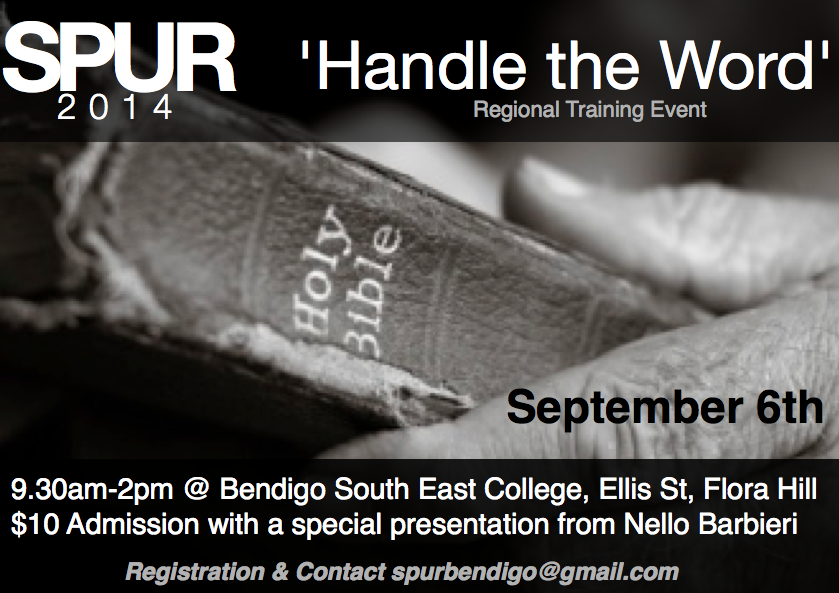1 Samuel 28:3-25 is one of the more difficult passages from the Old Testament, but it is clear that the chapter records how Saul, desperately needing advice about an impending war, consulted a medium who made contact with the recently dead Samuel. The fact that Saul did this shows how far he had slipped from grace. Having rejected God and His Word, Saul had nothing left to cling to. He refused to listen to God, so God stopped speaking to him, illustrating the biblical principle that we reap what we sow, which, in this case again, was to his further demise.
Author: Philip
Quarterly prayer gathering this Saturday – Sept 13th
 We’ll be meeting together for prayer this coming Saturday, September 13th from 10am – 12:30pm in the Upper Room. All are welcome. Come and join with us. Come when you can, leave when you must!
We’ll be meeting together for prayer this coming Saturday, September 13th from 10am – 12:30pm in the Upper Room. All are welcome. Come and join with us. Come when you can, leave when you must!
‘From the Last Supper to the Lord’s Supper’ (Matthew 26:17-30)
While artists have long tried to portray the last Supper scene, in Matthew 26:17-30, Matthew records the facts of how Jesus ate the Passover with his twelve disciples just before his death. By taking this meal which all Jews knew well, and adding new symbols that would point to his death, Jesus turned the Passover meal into something his disciples now use to remember him. The meal not only looks back but has a future aspect as it points forward to the day when believers will eat and drink with him in the glory of heaven.
‘Strengthening your grip … on the grace of God’ (1 Samuel 27:1-28:2)
1 Samuel 27:1-28:2 tells us how David under extreme duress, when considering what to do next, made some ‘pressure cooker’ decisions that were all backward steps. Fleeing across the border to the land of the Philistines, he was granted refuge, but ended up in hotter water – enlisted as the King’s personal bodyguard and engaged to fight his own people Israel. David not only forgot some things he should have remembered, but he also failed to keep a strong grip on God and lost sight of the need to persevere.
‘Ever get the déjà vu feeling?’ (1 Samuel 26:1-25)
In 1 Samuel 26:1-25, David and his men had a second opportunity to kill King Saul and end David’s life on the run, but it was David who showed kindness to Saul and spared his life. By that act and by his speech that followed, it seems that David had begun to grow in his understanding of God’s providence, his own sin and his own unimportance. Also, by these actions, David mirrored Jesus who entered the enemy’s camp and won a great victory over sin and death.
Spur 2014 is go!
‘Of Nabal, David, Abigail…and Jesus’ (1 Samuel 25:1-44)
1 Samuel 25:1-44 tells the story of Nabal the ungrateful who wanted to repay good with evil, David the vengeful who wanted to repay evil with evil and Abigail the peaceful who overcame evil with good. In fact in a wonderful way, by her offering and her actions, Abigail points us to the Lord Jesus Christ who placed himself under God’s wrath that those who believe may be spared it.
Biblical Perspective on Manhood and Womanhood
 Join us as we travel up to the Presbyterian Church in Rochester (Victoria Street) to participate in the Women’s Ministries Victoria seminar on Saturday August 30th from 10am.
Join us as we travel up to the Presbyterian Church in Rochester (Victoria Street) to participate in the Women’s Ministries Victoria seminar on Saturday August 30th from 10am.
The morning session is open to both men and to women. The post lunch session will mainly be directed towards the ladies. Morning tea and lunch are provided (at a small cost).
The speaker for the morning session is Rev. Dr Douglas Milne (former Principal of the Presbyterian Theological College).
‘To be or not to be (the one who gets revenge)? 1 Samuel 24:1-22
1 Samuel 24:1-22 tells us how David, while taking refuge in a cave from King Saul, had the perfect opportunity to launch a surprise attack upon Saul and put an end to his life on the run. But despite encouragement from his men to do this, David resisted the temptation and refused to kill the Lord’s anointed King. Taking revenge is never the Lord’s way of achieving his will.
‘David’s desert discoveries’ (1 Samuel 23:16-29)
1 Samuel 23:16-29 tells how David, after escaping once more from King Saul, found a hideout in the desert, only to be betrayed by the local people and have to take flight again from Saul’s rage. However, in this difficult situation, David’s was ‘strengthened in God’ by a visit from his loyal friend Jonathan which encouraged him. The ministry of encouragement is vital and not beyond any seek to serve and build up the people of the Lord.
